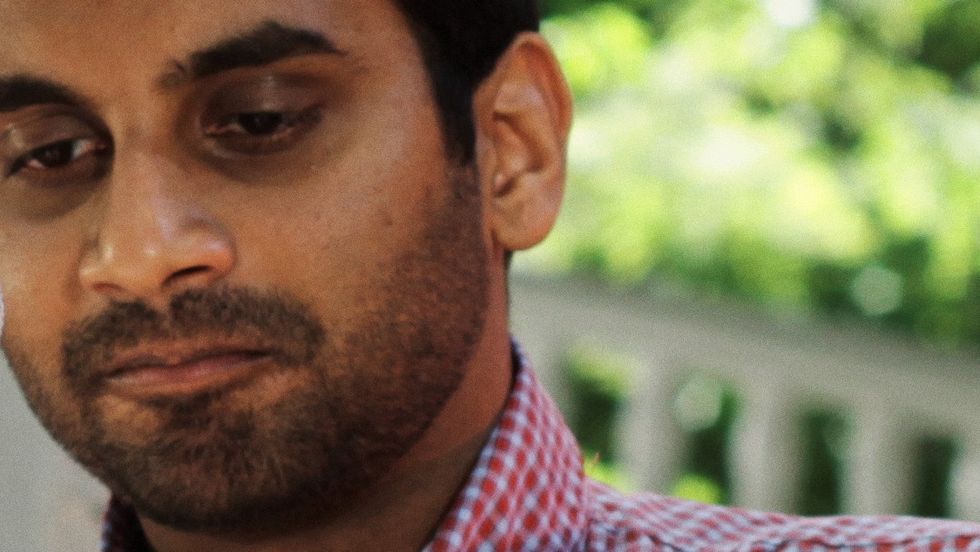I have spent an inordinate amount of time in the past couple of days reading about Aziz Ansari. For those of you who don’t know, Aziz Ansari is a comedian who was recently accused of sexual assault, just days after winning a golden globe while proudly wearing a “Time’s Up” pin, the symbol of ending sexual assault and harassment in Hollywood. With each article, my opinion has shifted a bit, being tugged to different sides by the perspectives of intelligent, outspoken women who have responded to the incident. One article, however, I found to be an especially disgusting way to respond to the allegations against Ansari.
The incident, described in this article, took place when a young photographer went on a date with Ansari. After the date, they went back to his apartment. What followed were a series of uncomfortable, often aggressive, and questionably consensual sexual activities. The young woman involved left the date upset, emotional, and feeling violated.
“The Humiliation of Aziz Ansari,” an article published in The Atlantic, took a problematic, scary incident and directed all of the blame at its victim, rather than addressing the nuances of what took place and respectfully acknowledging why its classification as an assault is less straightforward than many of the other #MeToo accusations.
The author of the article, Caitlin Flanagan, immediately proclaims herself as part of an older generation. She mentions how to her, the entirety of the incident seems foreign and fast-paced. She goes on to describe how each step leading up to the date would be seen by the media of her generation — labelling her shallow, desperate, cruel, and unwise. Though not personally calling Grace any of those things, Flanagan does not seem to disagree.
Flanagan pins the blame on Grace throughout her article, somehow making her excitement and hopefulness about the date into naivety and faults. She writes, “[Grace] tells us that she wanted something from Ansari and that she was trying to figure out how to get it. She wanted affection, kindness, attention.” As if being excited about a date or having high expectations is not something you are supposed to feel when meeting someone new. Were Grace to say she was nervous about the date, I’m sure Flanagan would have turned it around on her too, saying she should have followed her intuitions. This form of victim blaming allows her to dismiss Grace’s accusations as “3,000 words of revenge porn,” instead of taking them as what they are.
The article goes on to condemn not only Grace, but the modern woman in general. “...We were strong in a way that so many modern girls are weak,” Flanagan proclaims. Now here is where I think Flanagan could have made a valid and important argument about promoting women’s agency and responsibility in a culture in which Ansari can act this way. Instead of addressing how women must take action against rape culture - or more accurately, stop being taught the idea that they are not to say no by society — even if it should never have to be their responsibility, Flanagan demeans Grace for not immediately leaving or for hoping that Ansari would change his actions after her refusals. She says, “apparently there is a whole country full of young women who don’t know how to call a cab, and who have spent a lot of time picking out pretty outfits for dates they hoped would be nights to remember.”
It is comments like these that remind me of the sharp differences between feminists of today and those of older generations. You do not even need to agree that the case with Aziz Ansari was sexual assault in order to agree that it is an issue we need to tackle.
It seems that the responses from many women to Grace’s story come from having their own versions of this date. Almost all women of Flanagan’s generation have experienced similar things many times but were told that this is not the sort of situation that warrants a lot of attention or disgust. Growing up with that mindset, I can understand why it may be difficult to see that behavior as anything other than normal.
The problem, however, is that it is normal — exceedingly so. What Grace’s story is part of is a movement to push back against that norm.
In addition to her cold dissection of Grace’s story, Flanagan attempts to use Ansari’s race as a way to validate his actions, saying, “I thought it would take a little longer for the hit squad of privileged young white women to open fire on brown-skinned men.” She seems to believe that Ansari’s status as a person of color should somehow offer him protection under the guise of intersectionality.
However, this is exactly one of the reasons that Grace’s story is so important to hear. It’s not just powerful, wealthy white men who act in this way. It is also people of color who are known for being feminist and even intersectional. Ansari’s comedy profits off his persona as a “nice guy” and a feminist. He talks about and condemns behavior just like this in his stand-up, which is exactly why the story is that much more disturbing.
Clearly, I disagreed with the article. On the other hand, I myself feel hesitant in wholeheartedly putting Aziz Ansari in the category of men like Harvey Weinstein. Grace’s story is an important part of an ongoing conversation about rape culture. What constitutes assault and what do we do with the gray areas? It’s crucial to expose just how widespread this type of behavior is, even among those we least expect.
However, there is something to be said about Grace’s - and all women and feminists - role in all of this. I do not think Grace is to be blamed for what happened at all - Ansari’s actions are part of a normalized culture that paints violence as “sexy” and encourages men to believe that a “no” should be tested every five minutes, in case something has changed for some reason. In a case like Grace’s, as is true of so many women (myself included), that “no” sometimes does change, but only because we feel pressured, or tired of resisting. But if we expect change from men, we have to be part of that change.
Yes, she was a victim, and she is not responsible for changing Ansari’s behavior. I don’t feel comfortable assuming that in the moment she felt she could do anything. But anytime we do feel comfortable, we need to. Because for men to change the way they have been socialized to act in sexual situations, we need to change the way we react. By addressing the small, trivial things we brush aside because they are “not a big deal," we can become a voice that prevents people from doing things that are a big deal.









































